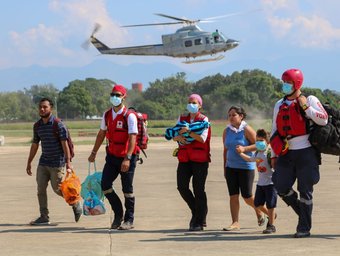Honduras
Key facts
Hazards covered by anticipation
Drought | Population movement| Tropical storms
Anticipation partners in country
Honduran Red Cross | German Red Cross | Red Cross Red Crescent Climate Centre | National Permanent Contingency Commission | National Center of Atmospheric, Oceanographic and Seismic Studies | Strategic institutions from the National Risk Management and Emergencies System | Start Network | Care International | Oxfam | World Vision | FAO
Inform Risk Index (2022)
Hazard and exposure: 4.5
Vulnerability: 6.2
Lack of coping capacity: 5.3
Total: 5.4 (high)
Rank: 34
Photo: Yoshi Shimizu / IFRC
Country profile
Honduras is one of the poorest countries in the Americas. In 2016, over 66 per cent of the population lived in poverty, and 20 per cent of the rural population lived on less than US$1.90 per day. Food insecurity is relatively common. High levels of inequality, as well as internal conflict and insecurity, exacerbate people's vulnerability and contribute to displacement, especially for those living at the lower end of the economic spectrum.
Honduras has a sub-tropical climate and its population is exposed to a number of hydrometeorological and geological hazards, including hurricanes, floods, landslides, drought and earthquakes. In 1998, for example, Hurricane Mitch killed over 10,000 people and caused approximately US$3 billion of damage to agriculture and infrastructure. Drought is also a regular occurrence, damaging crops and killing livestock, both of which contribute to food insecurity.
In June 2023, Honduras activated its Early Action Protocol for Drought.
Projects
Strengthening FbF readiness and disaster preparedness in Honduras
Since 2019, the Honduras Red Cross - with support from the regional forecast-based financing programme, which includes the German Red Cross, the Climate Centre and IFRC - has been developing Early Action Protocols (EAPs) for tropical storms and drought. It has plans to develop an EAP for crisis-induced internal displacement in the future.
In October 2022, it activated its EAP for Floods Associated to Tropical Storms; the final report on this activation is available here.
In February 2020, the Start Network provided Care International, Oxfam and World Vision with £300,000 for actions to anticipate the impacts of drought (alert 406).
FAO is supporting early action for drought in Honduras.


